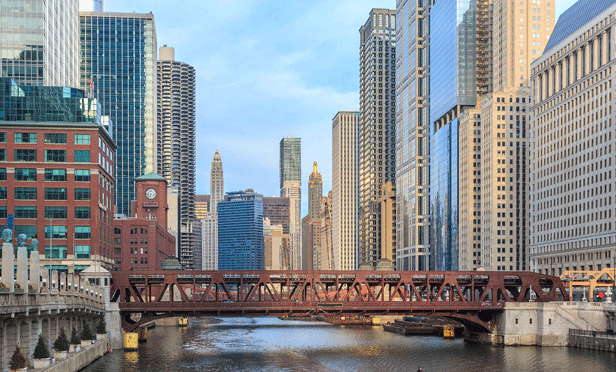CHICAGO—JLL recently released its Spring 2014 Chicago Skyline Review, a study of the top downtown office properties, and the firm's researchers say a significant drop in direct vacancy within these buildings has helped drive an overall improvement in the CBD.
The 54 properties included stretch from 300 E. Randolph St. near the lake to 540 W. Madison in the West Loop and provide the CBD's trophy class A spaces. All are all larger than 750,000-square-feet or taller than 30 stories. In addition, a Skyline building has to meet three or more of the following criteria: it competes at the top of its respective submarket, it was built or significantly renovated since 1985, has a high-profile location, a recognized tenant profile, or has architectural significance.
In the past year, the vacancy rate in these spaces declined from 15.1% to 14.3% and gross asking rents grew from $36.47-per-square-foot to $36.94, the highest that number has been since 2008. “Rents in this select group are now commanding a premium of nearly $4.00-per-square-foot over the remaining CBD buildings and that spread increased in 2013, signaling that the Skyline set is experiencing a more rapid recovery,” the report notes. “This spread is the greatest in the River North, Central Loop and East Loop submarkets.”
“We've picked the buildings that have the most impact on the market,” Steve Smith, the director of JLL's leasing practice in downtown Chicago, tells GlobeSt.com. “This analysis cuts a broad swath across the market, instead of looking at one submarket in isolation.” And it shows that “Chicago is an attractive market right now, and not just for users but for employees, especially the young people so many companies want to hire, and for investors.”
The CBD saw eight transactions for more than 100,000-square-feet, and four of these, including Omnicom's lease at Michigan Plaza, ComPsych's renewal at NBC Tower and Zurich American Insurance's relocation to 300 S. Riverside Plaza, were in JLL's Skyline buildings. “The impact of these leases will result in a future net absorption of approximately 100,000-square-feet,” the new report notes.
But the CBD has not seen a major new building added to the market since 2010, Smith points out, and by the time Hines' River Point tower at 444 W. Lake St. and John O'Donnell's 150 N. Riverside Plaza get delivered, the downtown will have gone about seven years without significant new top-of-the-line product.
The resulting competition for space should continue pushing down vacancy rates over the next couple of years, with a corresponding boost to rent levels, gradually transforming the CBD from a tenant's market to a more neutral one in 2014, and steadily increasing investors' interest.
“Suburban companies, especially high-tech companies, are moving downtown in greater numbers and they will continue to chip away at the supply,” Smith says. “If anyone has a major lease that expires prior to the completion of these new office towers they will have few options.”
Still, the flow of expanding start-ups and high-tech firms like Google into repurposed buildings in the West Loop and other neighborhoods will also take pressure off the Loop and lessen the need for major new developments. “I don't think we're going to see many more of these buildings, there are only so many anchor tenants.”
“Looking ahead to 2015 and beyond, the addition of new supply will cause tenants to vie for the newest and most high-end spaces,” the report concludes. “As these moves from existing to newly developed buildings occur, landlords will be challenged with backfilling a significant amount of space, causing a shift from a neutral negotiating environment to one that is more tenant favorable.”
Continue Reading for Free
Register and gain access to:
- Breaking commercial real estate news and analysis, on-site and via our newsletters and custom alerts
- Educational webcasts, white papers, and ebooks from industry thought leaders
- Critical coverage of the property casualty insurance and financial advisory markets on our other ALM sites, PropertyCasualty360 and ThinkAdvisor
Already have an account? Sign In Now
© 2024 ALM Global, LLC, All Rights Reserved. Request academic re-use from www.copyright.com. All other uses, submit a request to [email protected]. For more information visit Asset & Logo Licensing.








